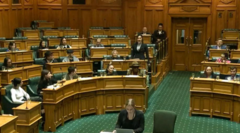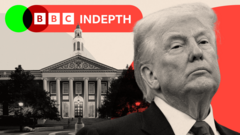Elon Musk, the wealthiest man in the world, has publicly declared President Donald Trump's key tax and spending legislation a "disgusting abomination," voicing concerns about its potential impact on the national debt and Republican unity.
Musk Alarms Republicans with Bold Critique of Trump's Tax Bill

Musk Alarms Republicans with Bold Critique of Trump's Tax Bill
Elon Musk's fierce critique of Trump's signature tax plan underscores growing rifts within the Republican Party.
In a notable political shift, Elon Musk has branded President Trump’s flagship tax and spending bill a “disgusting abomination,” following a sudden exit from the Trump administration just days prior. Musk's harsh criticism marks a significant departure from his previously supportive stance, reflecting an ongoing rift among Republicans over the legislation.
The controversial bill, which includes substantial tax breaks and increased defense spending, aims to raise the U.S. borrowing limit. After its recent passage in the House of Representatives, Musk took to social media, stating, “Shame on those who voted for it.” His comments come after a 129-day tenure in the Trump administration, where he attempted to spearhead cost-cutting initiatives.
The new tax plan, often hailed by Trump as the “big, beautiful bill,” has been projected to add approximately $600 billion to the budget deficit in the upcoming fiscal year, potentially resulting in an astonishing total deficit of $2.5 trillion over time. Musk described the bill as “outrageous” and laden with “pork,” which refers to the funding of projects that primarily benefit local voters rather than the broader public.
In the wake of his critique, Musk issued a political warning, advocating the removal of any Republican politicians who oppose Trump’s agenda in the upcoming elections. His discontent, however, isn’t isolated; various factions within the GOP have expressed concern over the bill’s financial ramifications. Notably, Senator Rand Paul has declared he will not back the plan if it increases the federal borrowing limit.
Response from the White House seemed dismissive of Musk’s remarks, with press secretary Karoline Leavitt reinforcing Trump’s optimism about the bill. Meanwhile, Senate majority leader John Thune emphasized the party's commitment to the bill despite internal disagreements. House Speaker Mike Johnson expressed regret over Musk's criticism, framing it as a misunderstanding of the bill's intentions.
Musk's previous relationship with Trump was characterized by strong financial backing, including significant campaign contributions. However, tensions have emerged due to Musk’s aspirations concerning the Federal Aviation Administration, particularly regarding air traffic control systems that he hoped to integrate with his Starlink satellite technology.
Interestingly, some Democrats have seized upon Musk’s criticisms as a sign that bipartisan concerns about the bill exist, suggesting the potential for more widespread opposition within legislative circles. With a deadline for approval set for July 4, some Republicans are pushing for compromises to secure the necessary votes while appeasing fiscal conservatives wary of rising national debt.
Amid the upheaval, Musk appears intent on recalibrating his political influence and aligning his future efforts closer to his business interests, further complicating the evolving dynamics of the Republican Party and its legislative ambitions.
The controversial bill, which includes substantial tax breaks and increased defense spending, aims to raise the U.S. borrowing limit. After its recent passage in the House of Representatives, Musk took to social media, stating, “Shame on those who voted for it.” His comments come after a 129-day tenure in the Trump administration, where he attempted to spearhead cost-cutting initiatives.
The new tax plan, often hailed by Trump as the “big, beautiful bill,” has been projected to add approximately $600 billion to the budget deficit in the upcoming fiscal year, potentially resulting in an astonishing total deficit of $2.5 trillion over time. Musk described the bill as “outrageous” and laden with “pork,” which refers to the funding of projects that primarily benefit local voters rather than the broader public.
In the wake of his critique, Musk issued a political warning, advocating the removal of any Republican politicians who oppose Trump’s agenda in the upcoming elections. His discontent, however, isn’t isolated; various factions within the GOP have expressed concern over the bill’s financial ramifications. Notably, Senator Rand Paul has declared he will not back the plan if it increases the federal borrowing limit.
Response from the White House seemed dismissive of Musk’s remarks, with press secretary Karoline Leavitt reinforcing Trump’s optimism about the bill. Meanwhile, Senate majority leader John Thune emphasized the party's commitment to the bill despite internal disagreements. House Speaker Mike Johnson expressed regret over Musk's criticism, framing it as a misunderstanding of the bill's intentions.
Musk's previous relationship with Trump was characterized by strong financial backing, including significant campaign contributions. However, tensions have emerged due to Musk’s aspirations concerning the Federal Aviation Administration, particularly regarding air traffic control systems that he hoped to integrate with his Starlink satellite technology.
Interestingly, some Democrats have seized upon Musk’s criticisms as a sign that bipartisan concerns about the bill exist, suggesting the potential for more widespread opposition within legislative circles. With a deadline for approval set for July 4, some Republicans are pushing for compromises to secure the necessary votes while appeasing fiscal conservatives wary of rising national debt.
Amid the upheaval, Musk appears intent on recalibrating his political influence and aligning his future efforts closer to his business interests, further complicating the evolving dynamics of the Republican Party and its legislative ambitions.




















